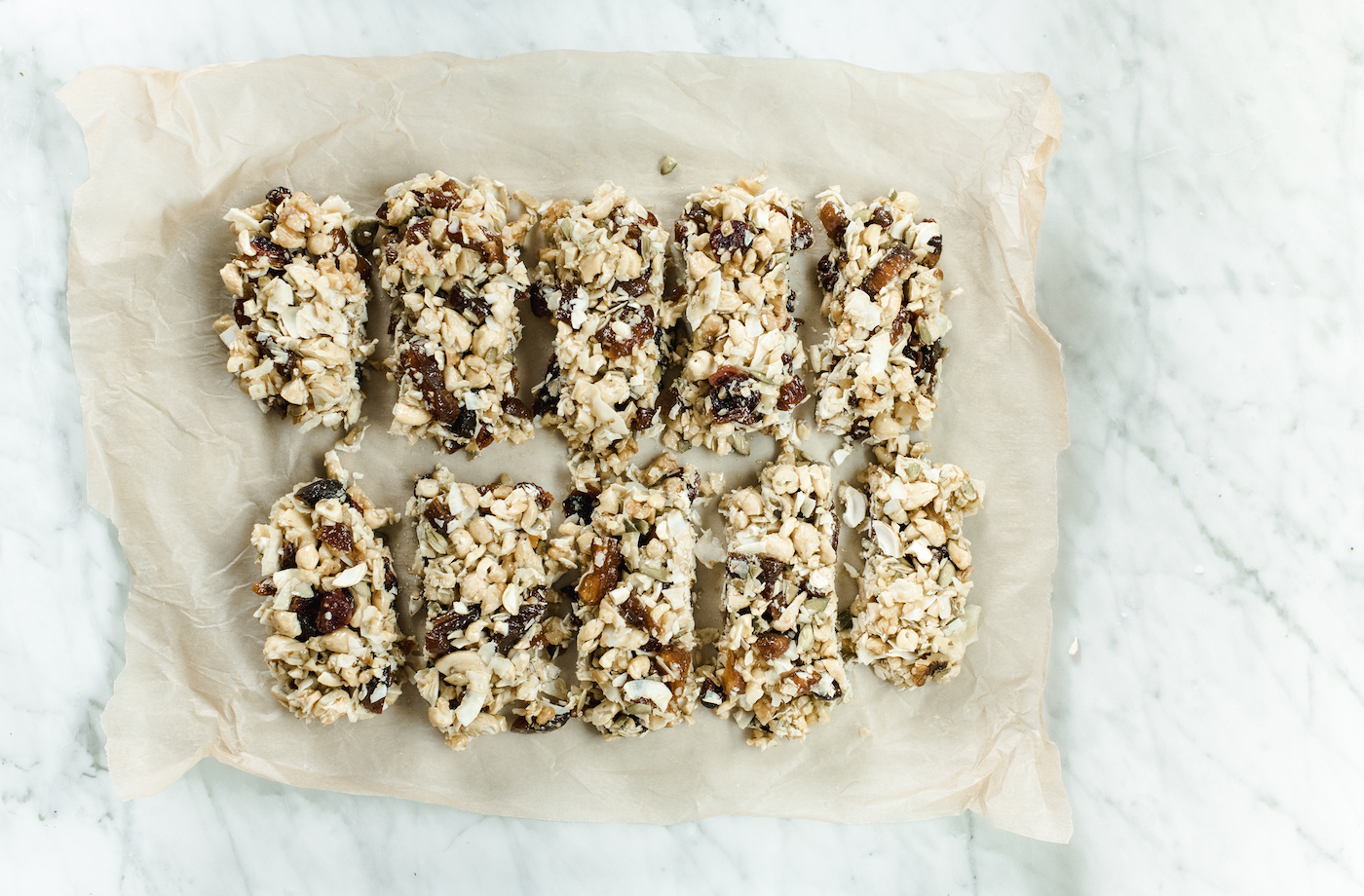These Nutty Homemade Granola Bars Will Make You Wonder Why You Even Bother With the Store-Bought Kind
Granola bars seem like the MVP of snacks. Not only are they downright delicious, but most importantly, you can toss one in your bag to have on hand when you’re out and about. But don’t be fooled by the marketing and packaging into thinking that all granola bars are inherently healthy. Many store-bought options include some questionable ingredients as well as tons of added sugar. As Sarah Adler, a nutrition coach, healthy lifestyle expert, cookbook author, and founder of Simply Real Health points out, a poorly-chosen granola bar can end up making you feel hungrier rather than providing you with fuel to get you to your next meal. Not cool.
The alternative: homemade granola bars. They’re easier to make than you’d think, and going the DIY route comes with a few perks that you don’t get with the store-bought kind. For one, you know what ingredients are in your granola bars, and thus can tailor them to your tastes and needs (and skip the boat-loads of sugar.) Plus, you can meal prep them over the weekend, wrap them up in parchment paper and tie a piece of ribbon around your bars if you want to make them Pinterest-worthy, and then pop them in the freezer, making your snack of choice easy to grab when you’re running out the door.
These reasons are what inspired Adler to create an upgraded version of a homemade granola bar. Her version stars nuts and apricots, both of which are packed with nutritional value and will keep you full as they should. “[The bars are] full of stabilizing natural protein from nuts and seeds, a dose of omega-3 fatty acids, and healthy fat from walnuts to keep you full,” she says. “Plus a touch of natural sweetness from the coconut and honey, and the needed minerals from the pinch of sea salt. You’ll never be tempted by the packaged versions again.” They're also gluten-free—a tough thing to find among traditional granola bar offerings.
If you don’t regularly keep some of these ingredients on hand, Adler suggests mixing up the dried fruit and nut combo depending on what you already have in your pantry. (Dried cherries and pistachios, anyone?) “For the best texture, the trick is using two different kinds of dried fruit, at least two different kinds of nuts, and some sort of seeds,” she says. If you want to get fancy, you can add in some chocolate chips or cocoa nibs, too, for a chocolatey pop. Oh, and did we mention, there’s no baking required?

{{post.sponsorText}}
Read on for Adler's full sweet-and-salty homemade granola bars recipe, plus tips on what to look for if you do go the store-bought route.

Vanilla apricot homemade granola bars
Yields 8 to 10 bars
Ingredients
2 cups cashews
1 cup walnuts
1 cup dried apricots
1 cup large coconut flakes
1/2 cup pumpkin seeds
1/2 cup dried cranberries
1/2 cup honey
2 tsp vanilla
1/2 tsp sea salt
1. Melt honey.
2. Chop cashews, walnuts, pumpkin seeds, and apricots—rough or fine, depending on your preferred texture.
3. Add all of the ingredients into a mixing bowl and mix until well-combined using a silicone spatula.
4. Add mixture to a medium parchment-lined square baking dish and press down evenly with the back of the spatula.
5. Pop the mixture in the freezer for at least one hour.
6. Remove from the freezer and cut into bars or cubes.
7. Store in the fridge until ready to eat.
What if I don't have time to make homemade granola bars?
If you’re in a time crunch (we get it, life gets busy) and opt for store-bought granola bars, there are some things you can look out for to ensure you grab a bar that’s delicious and going to keep you full and satisfied.
The first thing is sugar. Granola bars often have way too much sugar—whether it's just from using tons of tried fruit or from added sugar sources—and labels can sneakily disguise sugar as things that appear to sound wholesome (looking at you, brown rice syrup!). To keep things healthy, Melissa O’Shea, MS, RD, the national director of nutrition at Exhale Spa, recommends looking for a bar with eight grams of sugar or less per serving.
Oils are another thing to be cautious of on ingredient labels. Store-bought granola bars tend to contain hydrogenated oils, which have high saturated fat levels that aren’t good for heart health. Look for healthier oil alternatives such as avocado oil or extra-virgin olive oil. You may also spot fillers such as processed soy protein isolate on ingredients lists, which can cause upset stomachs in some people.
Other granola bar rules of thumb to keep in mind: Look for fiber (at least four grams per serving), at least eight grams of protein, and ensure that one bar equals one serving size. (You'll be surprised at how many are actually two servings!)
No matter which route you choose—homemade or store-bought—you're already in a better position to fight off those hangry feelings with a truly healthy, satisfying snack. Really, what's better than that?
Want some more healthy snack intel? Here are the foods a dietitian always snags when she goes to Trader Joe's:
Recipe excerpted from Simply Real Eating. Copyright 2020 by Sarah Adler. Reproduced by permission of The Countryman Press. All rights reserved.
Looking for other tasty, healthy recipes? Here are the veggie-forward dinners that doctors swear by. And check out these winter dinner ideas in case you're getting bored of your go-to soup recipe.
Loading More Posts...